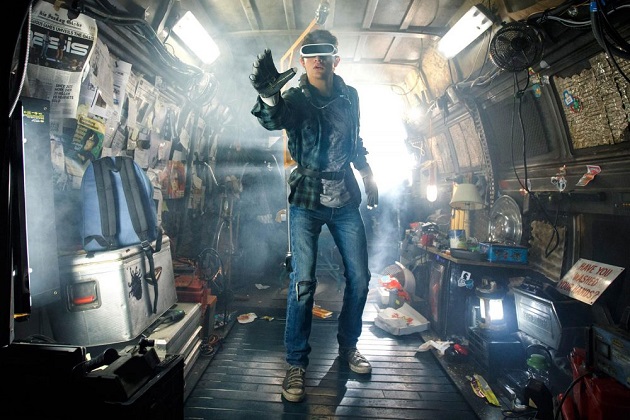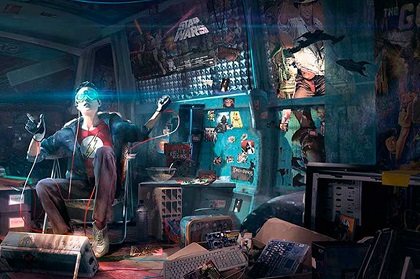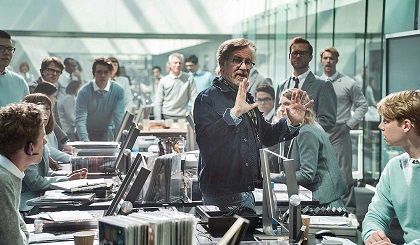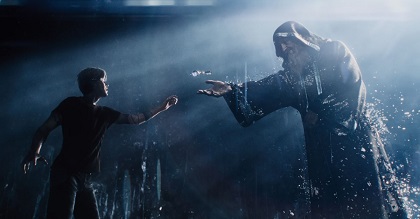It is easy to understand why many seek to escape by submerging themselves in virtual worlds - places where one can become what they have always dreamed of being.
 Ready Player One shows many of the themes Steven Spielberg addressed in previous films.
Ready Player One shows many of the themes Steven Spielberg addressed in previous films.
As we look at the reality the reality of who we are and the world that surrounds us, it is easy to understand why many seek to escape by submerging themselves in virtual worlds - places where one can become what they have always dreamed of being.
We call such worlds ‘OASIS’, the universe that Ernst Cline describes in the novel that Steven Spielberg has brought to the big screen: “Ready Player One” (2018). The director of “A.I Artificial Intelligence” (2001) and “Minority Report” (2002) presents us with a futuristic dystopia that warns us about the danger of finding refuge in paradises that go beyond the real world.
In 2011, Ernst Cline debuted as a novelist as he burst into the world of American science fiction literature with the publishing of “Ready Player One” (Random House). This successful novel tells the story of Wade Owen, the main character who lives in a dystopia where inhabitants try to wrestle with a world economic crisis through ‘OASIS’ (Ontologically Anthropocentric Sensory Immersive Simulation), a virtual universe that allows its players to do everything that they can’t achieve in real life.
In an interview with El País (a leading Spanish newspaper), when telling how he reacted to the news that Steven Spielberg was interested in directing a film based on his novel, the author acknowledged that it seemed like “a dream… I said that if it wasn’t for him I wouldn’t have written the novel”.
Cline is an ardent devotee of the pop culture of the end of the twentieth century, and as such the novel is full of nostalgic of Amblin entertainment, the entertainment company founded by Spielberg at the beginning of the 80s. Even the notebook that the main character’s avatar carries is a clear reference to “Indiana Jones and the Last Crusade” (1989).
Despite the enthusiasm of Cline and the 53 million dollars that the film earned in the first four days after its release on the 29th of March, the critics began to despair, accusing the director of looking for an easy blockbuster with a crammed triumphalism, special effects and little depth in the character’s personalities. One way or another, Spielberg’s feature films always end up cheesy, pretentious or merely comical for critics.

However, what is true is that each of the American director’s films is an intimate expression of his fears, desires and most personal ideals. For this reason, although many see “Ready Player One” as simplistic scaremongering in relation to the world of social media or virtual reality, for Spielberg it means much more than this. As the director himself commented to Guillermo Abril in an interview, ‘OASIS’ is a reminder that “many people, for little money, can escape to another life of their own making and forget about how it affects them in the real world”.
Fleeing from reality or facing it with all its consequences? This is not the only dilemma that “Ready Player One” presents us with, but is also the question that has pursued the king of Hollywood over the course of his life.
FLEEING FROM REALITY
In October 2017 HBO launched the great documentary “Spielberg”, directed by Susan Lacy, an expert in tearing down the mythology that popular culture created around the celluloid’s most emblematic figures. Midway through the feature film it is striking to hear Spielberg himself talk about the impact that his parent’s divorce has in almost all of his filmography.
Added to his self-esteem problems due to being a scrawny boy with “strange hobbies”, as one of his sisters remembers in the documentary, was the traumatic separation that fostered a silence between father and son that lasted 17 years. As a result, the only strategy that the young Spielberg had to face the crude reality of a broken home was to create parallel universes where extra-terrestrials from far away galaxies offered the company and affection that he was so lacking. Years later, these fantasies would be made into the leitmotiv of “Close Encounters with the Third Kind” (1977) and “E.T the Extra-Terrestrial” (1982).

In Spielberg “a Peter Pan syndrome” is easily recognisable, as Federico Alba mentions in his book “Spielberg’s fantastic film: Absent parents. Lost children” (Encuentro, 2017). On the one hand, this has been a source of inspiration, essential for moulding the director’s original narrative style. However, on the other hand, it has left him far from solving his personal problems in certain occasions. It is surprising and emotional to discover in Lacy’s documentary that Spielberg’s refusal throughout his youth to talk about his parent’s separation inevitability led him to believe for years, with quite a lot of anger and helplessness, that his father left his mother, when in reality it was his mother who decided to get a divorce after having cheated on his father with his best friend.
For this reason, “Ready Player One” is even more personal for Spielberg, especially if we consider Halliday’s character, a “creator who hates his creation”: a virtual universe that avoids the reconciliation with their loved ones in the real world. “I didn’t know how to connect with the people there. I was afraid, for all my life. Right up until I knew it was ending. That was when I realised, as terrifying and painful as reality can be, it’s also the only place where you can find true happiness. Because reality is real”.
THE TRUE PARADISE
Another aspect that has been irritating critics of Spielberg’s films is the positive tone that the majority of his feature films have. In fact, this is one of the elements that was most criticised in “Ready Player One”. This does not seem to phase Spielberg as, although he affirms that “every new medium that provides an escape route from our responsibilities is dangerous”, he recognises that it has “a very positive vision”. “Even when things appear to be at their darkest”, the director thinks that “the dawn will still arrive”.
However, these statements contrast with the diagnostic that Spielberg himself makes about our situation with respect to the virtual worlds that we have created; “This film illustrates how many people would prefer to live in a world of their own creation instead of transforming the one into which they were born.” Is this not a contradiction in which we all find ourselves? Throughout our lives we long for glimpses of something authentic and real in this world, but if we are sincere for a moment we realise that actually we prefer to embrace those lies that speak good of ourselves before accepting the truth about who we really are. Creating alternate realities that make life more bearable seems inevitable.
Last summer Ernst Cline told Luis Sucasas that “pop culture could become a religion”, a virtual reality which can help understand and give meaning to the world in which we live. Sucasas captures the idea well as he says that today “the moral teachings that young people receive come more from Luke Skywalker than from Jesus”. And is this not how many see the Christian faith and its promises, even from within the church? An alternative reality, a virtual paradise that makes this existence easier but that, at the end of the day, it is just “a fairy tale” that encourages us to be better people.
However, if one reads carefully it is easy to see that the Bible does not propose a lifestyle that can make us better people. This would be like trying to change a leopard’s spots (Jeremiah 13:23). The true dystopia is found in the human heart (Mark 7:21). Moreover, the paradise that the gospel gives us is very different from any other virtual reality that man has imagined to bring hope and meaning.

Many religions or virtual realities such as ‘OASIS’ create hope in worlds where one day we will be able to have all that we can’t permit ourselves now in earthly or real life (drink, food, sex, possessions, health, etc). In contrast, Christianity offers us a relationship. An authentic, personal relationship with someone who accepts the truth of who we are and offers us a complete transformation through forgiveness and undeserved favour. For Christians, the true paradise is not a prized place or an object, it is a person, Jesus of Nazareth, the only one who can truly satisfy our thirst for something real (John 4:14).
Who would think that something like this could give hope? Yet this is becoming the experience of millions of believers around the world as we await this Paradise that goes beyond the reality we currently behold. As C.S. Lewis says, we believe that “at present we are on the outside of the world, the wrong side of the door. We discern the freshness and purity of morning, but they do not make us fresh and pure. We cannot mingle with the splendours we see. But all the leaves of the New Testament are rustling with the rumour that it will not always be as so. Someday, God willing, we shall get in”.

Las opiniones vertidas por nuestros colaboradores se realizan a nivel personal, pudiendo coincidir o no con la postura de la dirección de Protestante Digital.
Si quieres comentar o